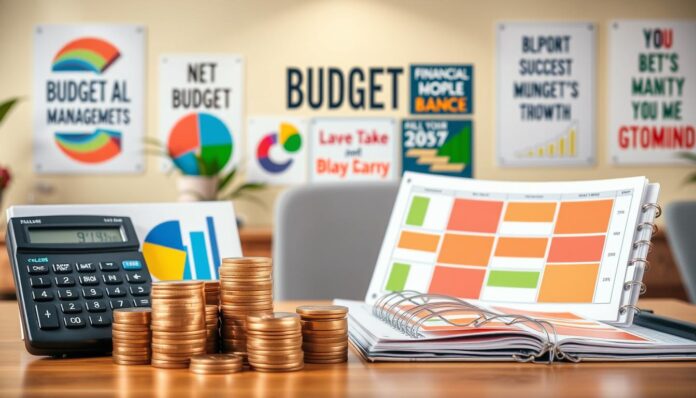Ever wondered why some businesses do well while others struggle? It’s often because they master budget management skills. Good financial planning is more than just tracking money. It’s about making smart choices that help you succeed, whether in your personal life or work.
In today’s world, knowing how to budget well can be the key to reaching your goals. Good budget managers use skills like thinking critically, communicating well, and solving problems. These skills help you plan expenses, keep costs down, and use resources wisely.
Understanding the importance of budget management skills is key for anyone wanting to use resources better and improve accountability. By always learning and getting better at these skills, you boost your financial knowledge. This helps you succeed even more in the future.
Table of Contents
Key Takeaways
- Budget management is essential for project success and efficient resource allocation.
- Six key skills are critical: analytical, communication, organizational, problem-solving, leadership, and learning skills.
- Good budget planning means knowing your income and expenses and making smart predictions.
- Tracking expenses regularly helps find ways to save money and stay on budget.
- Variance analysis lets organizations check how well they’re doing with their budget and make changes if needed.
Introduction to Budget Management
Learning to manage your budget is key to good financial planning. It helps you use your money wisely, which boosts both personal and work success. Understanding how to budget means knowing where your money comes from and how it’s spent.
Organizations check if projects are worth it by looking at costs. Sadly, 28% of project failures come from wrong cost guesses. So, budgets are now a big deal for project success. Top companies aim to finish projects on time and under budget, without sacrificing quality.
It’s vital to know different budgeting methods for projects. You can use bottom-up, top-down, or other methods to fit your needs. Checking budget accuracy after each project helps improve your skills over time.
Don’t forget about labor costs in your project budget. Budgeting helps plan, manage spending, and check if you’re meeting goals. As a manager, knowing about money matters is part of your job.
Budgets are made yearly to match the company’s goals for the next year. A budget committee helps set rules and review budgets. They might also create a budget manual with all the details.
Many things affect how you budget. Knowing where your money comes from is key. You need to split costs into different areas like staff, space, and materials. Knowing fixed and variable costs helps you budget better.
Incremental budgeting uses last year’s numbers, while zero-based budgeting starts from scratch. Getting feedback from others and checking how you’re doing is important. Things like inflation and market changes also play a big role in your budget.
Budgeting is a continuous process. Keeping an eye on your targets helps you stay on track financially. To learn more about budgeting, check out this resource and improve your financial planning.
Importance of Budget Management Skills
Good budget management skills are key to being financially smart and reaching your money goals. A solid budget helps you keep track of your spending. It also teaches you how to save money and avoid spending too much. This is very important for managing your personal money well.
Companies also gain a lot from good budget management. It helps them use resources better, make more money, and make smarter choices. A good budget makes sure money activities match up with the company’s goals. This leads to a disciplined and accountable financial environment.
There are many budgeting techniques for different needs. Incremental budgeting is simple and works well for companies with steady costs. Zero-based budgeting makes every expense justified, cutting out unnecessary costs. These methods vary in complexity, fitting different company needs.
Some businesses might use activity-based budgeting, which needs more resources but is flexible. This is good for companies that are new or going through big changes. Choosing the right budgeting strategy can greatly improve your financial health and lead to better business results.
To learn more about budgeting strategies, check out this detailed guide. With good budget management, you’ll likely see your financial stability improve. You’ll also have a clearer picture of your financial performance.
| Budgeting Method | Advantages | Disadvantages |
|---|---|---|
| Incremental Budgeting | Simple, saves time | Not suitable for variable costs |
| Zero-Based Budgeting | Removes irrelevant costs, promotes accountability | Time-consuming, requires in-depth analysis |
| Activity-Based Budgeting | Provides flexibility, good for change | Resource-intensive and requires detailed data |
| Flexible Budgeting | Adapts to market changes | Requires ongoing adjustments |
| Value Proposition Budgeting | Highlights core values, maximizes customer value | Complex to quantify values |
By learning and using these budgeting methods, you can improve your budgeting skills. This will help you achieve financial success.
Key Financial Concepts You Should Know
To manage budgets well, knowing key financial terms is essential. Understanding operating cash flow is critical. It shows money coming in and going out from daily operations. This includes revenue, payments to suppliers, and salaries.
Terms like gross profit, operating profit, and net profit show how profitable a business is. Gross profit is revenue minus the cost of goods sold. Operating profit subtracts operating expenses, and net profit includes taxes and interest.
Managing accounts receivable well means getting payments on time from customers. Keeping an eye on late payments can boost your cash flow. Knowing cash and accrual accounting is also important. Cash basis records transactions when cash is exchanged, while accrual basis records them when they happen.
Understanding the balance sheet is key. It lists a business’s assets, liabilities, and equity at one time. Knowing these helps grasp a company’s financial health. Risk and return are also important in making financial decisions.
Metrics like Return on Investment (ROI) and Net Present Value (NPV) are also vital. ROI shows the gain from an investment, and NPV compares current and future money values. Knowing different cash flow types helps in detailed budget analysis.
Free cash flow is also important. It’s the cash left after taxes, depreciation, and capital spending. For future investments, the future value formula is useful.
To learn more about budgeting, check out this resource. Mastering these financial concepts will help you manage budgets better. This leads to smarter financial choices.
Effective Budgeting Strategies for Personal and Business Goals
Effective budgeting is key for reaching personal and business goals. Start by setting clear financial goals. This will guide your planning. Break your budget into easy-to-manage categories to track and stay focused.
The 50/30/20 rule is a helpful budgeting method. It suggests using 50% for needs, 30% for wants, and 20% for savings or debt.
Tracking your expenses is vital. It helps keep your financial plans on track. Use different methods like cash budgeting or separate bank accounts for different expenses to stay accountable.
Good financial planning is very important. It helps you understand your financial situation. Collect data on income, expenses, assets, and debts to set goals.
Make a budget that fits your goals. It should allocate resources wisely and keep spending in check. Regularly check your spending against your budget to make needed changes.
| Budgeting Method | Description | Benefits |
|---|---|---|
| Zero-Based Budgeting | Every dollar is allocated a specific purpose, requiring justification for each expense. | Increases awareness of spending and reduces waste. |
| Cash Budgeting | Encourages spending with physical cash to decrease impulsive expenditures. | Helps limit overspending and encourages mindful purchases. |
| Priority Budgeting | Expenses are prioritized based on personal preferences. | Ensures that essential expenses are covered while allowing for personal enjoyment. |
Good communication is essential for budgeting success. Share financial insights to foster accountability in your team. Learning more, like an MBA, can improve your financial skills. For more on how an MBA can help, check out this resource.
Expense Tracking Techniques
Tracking your expenses is key to managing your money well. It helps you understand how you spend and make smart financial choices.
Try mixing different tools and methods to track your spending. This way, you can see where your money goes and plan better.
- Budgeting Apps: Tools like Mint and YNAB let you track expenses easily. They help you stick to your budget.
- Spreadsheets: Making a custom spreadsheet for your money can be very helpful. It’s flexible and fits your needs.
- Detailed Records: Keeping detailed records with receipts and invoices helps you stay accountable. It shows your financial health clearly.
- Regular Reviews: Review your spending weekly or monthly. This helps you spot patterns and adjust your budget.
The table below shows the main points of different ways to track expenses:
| Tracking Method | Accessibility | Cost | Customization | Real-Time Updates |
|---|---|---|---|---|
| Budgeting Apps | Mobile and Web | Varies (often free or subscription) | Moderate | Yes |
| Spreadsheets | Desktop and Cloud | Free to low cost (software subscription) | High | No |
| Detailed Records | Physical or Digital | Free | N/A | No |
| Regular Reviews | Any | Free | N/A | No |
Make these methods part of your daily life to improve your money tracking. By managing your finances well, you’ll be more disciplined with money.
Budget Analysis: Understanding Variances
Budget analysis is key to seeing if a business or person can reach their financial goals. It compares what was planned with what really happened. This helps find areas that need better planning.
Doing this analysis regularly, like monthly or yearly, keeps finances healthy. It shows how well a business is doing and where it can improve.
This process gives deep insights into how things are going. It helps understand what works and what doesn’t. For example, good variances mean more money, while bad ones show problems.
| Type of Variance | Description |
|---|---|
| Price/Rate Variance | Differences between industry standard costs and actual pricing for materials. |
| Efficiency Variance | Shows deviations between the actual input values and the specified input amounts. |
| Quantity Variance | Compares the actual amount of resources used against budgeted projections. |
| Volume Variance | Reflects differences between actual fixed overhead costs applied and budgeted fixed overhead costs. |
Financial Planning and Analysis (FP&A) analysts report on these variances. They use Excel to do the math. The formula is simple: Actual Spending – Budgeted Spending = Variance.
Management reports are key here. They list variances, why they happened, and how to fix them. This makes data useful for making smart choices. It helps in making better spending decisions and forecasting.
To learn more about improving your budget analysis and financial results, check out effective startup marketing models.
Budget Management Skills: Essential Tools and Resources
To get better at managing your budget, you have many tools and resources. Programs like QuickBooks and Microsoft Excel help organize your spending and track your income. Budgeting apps like YNAB (You Need A Budget) make it easy to understand your finances and make smart choices.
Learning from online courses and workshops can really help. These resources teach you about budgeting and take about 20 hours to finish. Learning this way can make your budgeting skills better, which is good for your work.
Getting feedback is key to improving your budget skills. Working with others and learning from them can make your team better at budgeting. This teamwork helps build strong relationships and clear financial dealings.
Table 1 below shows some important features for budgeting:
| Tool/Resource | Key Features | Benefits |
|---|---|---|
| QuickBooks | Comprehensive reporting, invoicing | Streamlines financial management |
| Microsoft Excel | Customizable templates, data analysis | Flexible budgeting and forecasting capabilities |
| YNAB | Proactive budgeting, expense tracking | Encourages financial discipline and awareness |
| Online Courses | Structured learning, expert support | Enhances knowledge of best practices |
Keep working on your budget skills. Always look for ways to get better. Using the right tools and learning new things will help you grow in managing your finances.
Developing Financial Discipline
Building financial discipline is key to managing money well. Having clear routines and sticking to your budget helps a lot. Setting financial goals is the first step to creating lasting habits.
The 50/30/20 budgeting strategy is a great way to improve your financial habits. It means spending 50% on needs, 30% on wants, and 20% on savings and debt. This way, you can cover important costs and enjoy some extras without overspending.
Having an emergency fund is also vital. It should cover three to six months of living costs. This fund is your safety net during tough times. Experts say save 10% of your income if you’re under 40. Save 15% to 20% if you’re between 40 and 50.
Keeping track of your spending is important. It helps you see where your money goes. Setting up automatic savings and debt payments makes managing money easier. Try setting aside $50 or $100 each month for fun things to keep your spending in check.
Working with a financial advisor can also help a lot. They can keep you on track and motivated. Their advice can improve your money management skills and help you reach your financial goals.
| Financial Goal | Recommended Saving Percentage | Purpose |
|---|---|---|
| Emergency Fund | 3-6 months of expenses | Safety net for unexpected costs |
| Retirement Savings (under 40) | 10% | Building wealth for the future |
| Retirement Savings (40-50) | 15-20% | Securing a comfortable retirement |
| Discretionary Spending | $50-$100 monthly | Avoiding impulsive purchases |
Continuous Learning and Improvement in Budget Management
Learning continuously is key to getting better at managing your budget. By looking for new budgeting tips and financial planning ideas, you can keep up with today’s fast money world. Workshops and mentoring programs can give you the tools you need to manage your budget well.
By focusing on learning more, you can try out different budgeting methods to see what works for you. You’ll learn about financial rules, new tech, and how to use resources wisely. These are all important for planning your finances.
- Stay updated with industry trends and financial regulations.
- Participate in networking events and discussions.
- Invest in online courses and certifications.
- Utilize software solutions that can aid in strategic automation.
By following these steps, you can keep improving at budget management. As you get better, you’ll make choices that help your projects and your company’s money health. Learning more about budgeting will help you secure a strong financial future.
For more tips on making your company financially successful, check out this detailed guide on Human Resource Management.
Conclusion
Learning to manage your budget is key to personal and business success. It helps you meet your financial goals and understand past budgets. This skill lets you set clear financial targets that match your dreams.
Knowing about different budgets, like operating and cash budgets, is important. It helps you create a budget that fits your goals. Using tools like Cflow and apps like You Need a Budget (YNAB) makes budgeting easier and clearer.
In short, good budget management skills, the right tools, and ongoing learning help you face budget challenges. Whether you aim to save for emergencies or follow a budget like 50/30/20, your effort will lead to a secure financial future.
FAQ
What are budget management skills?
Budget management skills help you plan, track, and control money. It’s about understanding how to budget and track expenses. This ensures you stay on top of your finances.
Why is financial literacy important?
Knowing how to manage money is key. It lets you make smart financial choices. You learn how to budget and save, helping you reach your goals.
How can I improve my budget management skills?
To get better at managing your budget, learn about finance. Use budgeting tools and track your spending. Keep learning with workshops and training on money management.
What are some effective budgeting strategies?
Good budgeting starts with clear goals. Categorize your spending and use methods like zero-based budgeting. Regularly check if you’re meeting your financial targets.
What tools can I use for expense tracking?
Use apps, spreadsheets, or software like QuickBooks and Excel for tracking. These tools compare your spending to your budget. They help keep you financially disciplined.
What is budget analysis?
Budget analysis compares your budget to your actual spending. It shows if you need to adjust your budget. This helps you make smart financial decisions.
How does financial discipline affect budgeting?
Staying disciplined with your budget is critical. It means following your budget and regularly checking your goals. This builds healthy financial habits and accountability.
What is the importance of continuous learning in budget management?
Always learning is key to improving your budget skills. Keeping up with new strategies and technology enhances your financial practices. It boosts your budgeting abilities.







